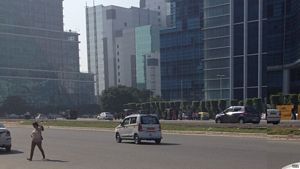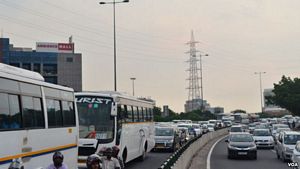|
By accessing or using The Crittenden Automotive Library™/CarsAndRacingStuff.com, you signify your agreement with the Terms of Use on our Legal Information page. Our Privacy Policy is also available there. |

India’s Business Hub Experiments with Car-Free Day
|
|---|
|
|
India’s Business Hub Experiments with Car-Free Day
Anjana Pasricha, VOA News
22 September 2015 (8:54AM)
 Usually choking with cars, this road leading to Gurgaon's major corporate towers was relatively empty Tuesday morning, Sept. 21, 2015. (VOA/ A. Pasricha) Usually choking with cars, this road leading to Gurgaon's major corporate towers was relatively empty Tuesday morning, Sept. 21, 2015. (VOA/ A. Pasricha)
 Gurgaon's roads are usually choked with a sea of vehicles, Tuesday, Sept. 21, 2015. (Photo: A. Pasricha) Gurgaon's roads are usually choked with a sea of vehicles, Tuesday, Sept. 21, 2015. (Photo: A. Pasricha)
|
NEW DELHI — On the occasion of World Car-Free Day, India’s business hub of Gurgaon adjoining New Delhi experimented with encouraging people to leave their vehicles at home. It was not entirely successful, but was hailed as a much needed initiative to reduce alarming levels of pollution and traffic woes in Indian cities.
Although she does not have to drive a long distance, Tanav Mishra is among millions of office goers who dreads her daily commute to the thriving business hub of Gurgaon.
“If you start by nine, you keep your fingers crossed you’ve reached your office by 10," said Mishra. "Traffic is such a big havoc here.”
On Tuesday, responding to a call to observe a Car-Free day in the city, Mishra took the metro to work.
She was delighted.
“I could see less number of cars on the road itself, that was a good thing. Every week once, it must be there,” she said.
Senior corporate executives and police officers were among those who braved the heat and humidity to take public transport or cycle to work. Authorities put more buses on the road, and ran additional shuttle services from metro stations.
However, in a city with grossly inadequate public transport, not everyone left their cars behind, and traffic jams persisted at several points.
Gurgaon, home to multinational companies, swanky apartments and glitzy malls, has grown hugely in the past decade as India’s economy has expanded. But its affluence has come at a price: its roads are choking with cars and its traffic jams are legendary.
It is a story that is repeated in some measure across urban India, as an exponential growth in motorized vehicles creates traffic gridlock and worsens air pollution.
A first step
The capital Delhi is the worst hit — it has the world’s dirtiest air, which health experts warn is threatening people’s health.
Despite the patchy success of the car-free day in Gurgaon, Anumita Roy Choudhury at New Delhi’s Center of Science and Environment, called the initiative an important first step. She hopes it will put public pressure on policy makers to implement measures to regulate the number of cars in Indian cities in the same way as cities like Beijing, Singapore and Hong Kong have done.
“The cities will really have to work with restraint measures," said Choudhury. "The current practice of giving them free parking, not taxing them, allowing multiple car ownership, all these are fanning motorization and taking it beyond what is sustainable. If all our cities are getting polluted, it is because those decisions are not getting implemented.”
Gurgaon hopes to show the way by pressing ahead with the initiative. Police Commissioner, Navdeep Singh Virk, who cycled to work, wants to make every Tuesday a car-free day.
“The idea is not to stop there, the idea is to take it to a weekly basis," said Virk. "We are in a state where we actually require it.”
Those who live through the traffic nightmares of Gurgaon, such as Deepak Rajput, could not agree more.
“Lot of traffic, lot of pollution, we do need less cars, it is a no brainer,” he said.

















